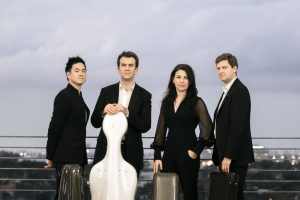By Rick Koster, Day Staff Writer | October 6, 2019

How many Musical Masterworks musicians does it take to blow out 250 birthday candles?
Four — at least if it’s the Ehnes Quartet and they’re celebrating the sestercentennial of Ludwig von Beethoven’s birth. Rather than extinguish tapirs on a cake, though, the quartet has bigger plans. Over the course of six different concerts on March 13-15 and May 1-3, this internationally exalted group will perform all 16 of Beethoven’s string quartets as the conclusion to the 2019-20 Musical Masterworks chamber music series. In fact, the Quartet will play 18 works including Beethoven’s different editions of op. 130.
It’s a monumental and relatively rare undertaking — a devoutly-to-be-wished project long-envisioned by Masterworks artistic director and resident cellist Edward Arron — and will serve as an exclamation point on a diverse and creative series of programs that start the Masterworks season Saturday and Sunday.
As always, Musical Masterworks performances take place in Old Lyme’s aesthetically sublime First Congregational Church, and for the opening concerts on October 19th and 20th, Arron will be joined onstage by pianist Gilles Vonsattel and violinist Stefan Jackiw. They’ll tackle Mozart’s Sonata in G Major for Violin and Piano, K. 379; Ravel’s Piano Trio in a minor; and Schumann’s Piano Trio in d minor, Opus 63.
“Stefan, who is a dear friend, was supposed to make his Musical Masterworks debut years ago but suffered an injury,” Arron says. “We’ve been trying to work out our schedules ever since, and we’ve finally made it happen.” Arron is on the phone from the New York City apartment he shares with family. Perpetually cheery, humble and eloquent in conversation, Arron alternately addresses the interviewer as well as the Arron’s Labrador Retriever, Sancho Panza, who’s barking in the background.
“Normally, he just sleeps under the piano,” Arron explains, referring to the dog and not Stefan Jackiw — adding of the latter, “He’s a deep thinking player, and I tried to come up with a special program that would appeal to him as well as Gilles, who’s an elegant and intelligent pianist. The craftsmanship in these pieces in the hands of these artists should be special.”
Arron is equally excited about the two concerts that will segue into the Beethoven finales.
December 7-8 — L’isle joyeuse for solo piano and the Trio in g minor, both by Debussy; Villa-Lobos’ Assobio a Jato for Flute and Cello; Kevin Put’s Air for Cello and Piano; and Farrenc’s Trio in e minor, Opus 45.
Musicians: Pianist Adam Neiman; Arron; flutist Tara Helen O’Connor
Arron: “This trio has performed at Musical Masterworks before, and I cannot forget the audience response. They were so joyful. So I wanted to recreate that combination with a new and diverse set of pieces that features both familiar and less familiar composers.”
February 8-9 — J.S. Bach’s Trio in g minor for Violin, Cello and Bass; John Corigliano’s Stomp for Solo Violin; Turina’ Piano Quartet in a minor, Opus 67; Schubert’s Quintet in a major for Piano and Strings, D. 667, “Trout”; and original pieces by Lark and Thurber.
Musicians: Violinist Tessa Lark; double bassist Michael Thurber; violist Ettore Causa; Arron; pianist Jeewon Park
Arron: “This is a really interesting program. To hear these artists play Schubert and Bach is just amazing, but the contrast with the work by Lark and Schubert — which is bluegrass inspired and absolutely toe-tapping — presents an entire different side of what can be done in a chamber music context.”
If Arron, now in his 11th year at MM, is excited for the season, it’s also true the decision to tackle the marathon Beethoven cycle is something that means a lot to him.
“Sometimes, when you’re programming a season of music, you’ll make a discovery about some big anniversary and think, ‘Uh oh, I forgot about that; I hope I have time to re-tool the program!’ In this case, I’ve been planning for Beethoven’s 250th birthday since his 240th birthday,” Arron says.
The string quartets span the whole of Beethoven’s life and provide significant biographical insight to the evolutioin of his genius. Critics often describe the first six as the Early Quartets, written when he was 27-30 years old, and if as some critics suggest they are perhaps a bit derivative of Haydn and Mozart, it’s also true the expansive range of emotions captured in the pieces reflect the glorious possibilities of youth.
The five Middle Quartets include three commisioned by Count Razumovsky, an accomplished musician who was also the Russian ambassador in Vienna. The later two from this period are nicknamed The Harp and The Serioso — and Beethoven, who was aged 35-40 in this period, was beginning to go deaf and learning to live with and adjust to the condition.
He finished the final batch while he was completely deaf and emotionally and physically exhausted — an astonishing accomplishment in any case. That the five quartets are universally regarded as sheer masterpieces almost defies belief.
“Every one of these pieces is like a Mount Everest,” Arron says. “As far as chamber music goes, it’s a momentous thing to see even one quartet much less a few of them. To bring this body of work to life in its entirety is something we look forward to. This music will always be relevant, and to perform it for those who love it or for audiences who haven’t had the chance to discover it, is something I’ve dreamed of over and over. But to do so on the 250th anniversary and to bring it to this special place in Old Lyme and these special fans is really exciting. And, then, of course, there’s the Ehnes Quartet.”
Indeed. Not only is the ensemble — Arron, violinists Amy Schwartz Moretti and James Ehnes and violist Richard O’Neill — a critically elite, international touring unit, the four musicians are also good friends. You can hear the happiness in Arron’s voice when he describes the group’s ties. He and Ehnes were suitemates at Juilliard; Ehnes has known Schwartz Moretti since they were kids in summer camp; and they variously met and became close to O’Neill from years on the classical music circuit.
“We all have families and separate careers and live in different cities,” Arron says. “But there’s a lot of love in this group. We might only be able to figure out how to play 20 or so concerts together a year, but the art of the string quartet is important to us, and it’s important to us that we carve out the time to play together.
“The chemistry will be created as it happens over the course of these concerts, and we discover fresh moments along with the audience. Music can be enjoyed on so many levels. To close your eyes inside (the First Congregational Church) and let the music and energy wash over you and use your imagination to enjoy the beauty and rigor. And then to OPEN your eyes and watch the physicality and interaction between not just the musicians but everyone in the room … Music releases and stirs an enormous range of emotion, and within the context of these quartets, it becomes clear that this is one of the greatest artistic achievements in history.”
To schedule the complete Beethoven String Quartets, a third concert has been added to the March and May concerts. As such, the programs in the series line up as follows:
March 13: String Quartet in F Major, Opus 18, No. 1; String Quartet in f minor, Opus 95, “Serioso”; String Quartet in B-flat Major, Opus 130
March 14: String Quartet in B-flat Major, Opus 18, No. 6; String Quartet in E-flat Major, Opus 74, “Harp”; String Quartet in E-flat Major, Opus 127
March 15: String Quartet in D Major, Opus 18, No. 3; String Quartet in F Major, Opus 135; String Quartet in e minor, Opus 59, No. 2, “Razumovsky”
May 1: String Quartet in c minor, Opus 18, No. 4; String Quartet in A Major, Opus 18, No. 5; String Quartet in c-sharp minor, Opus 131
May 2: String Quartet in F Major, Opus 14, No. 1 (after Piano Sonata in E Major); String Quartet in F Major, Opus 59, No. 1, “Razumovsky”; String Quartet in B-flat Major, Opus 130, with Grosse Fuge, Opus 133
May 3: String Quartet in G Major, Opus 18, No. 2; String Quartet in C Major, Opus 59, No. 3, “Razumovsky”; String Quartet in a minor, Opus 132.
Click to purchase a subscription, mini-subscription or individual tickets


